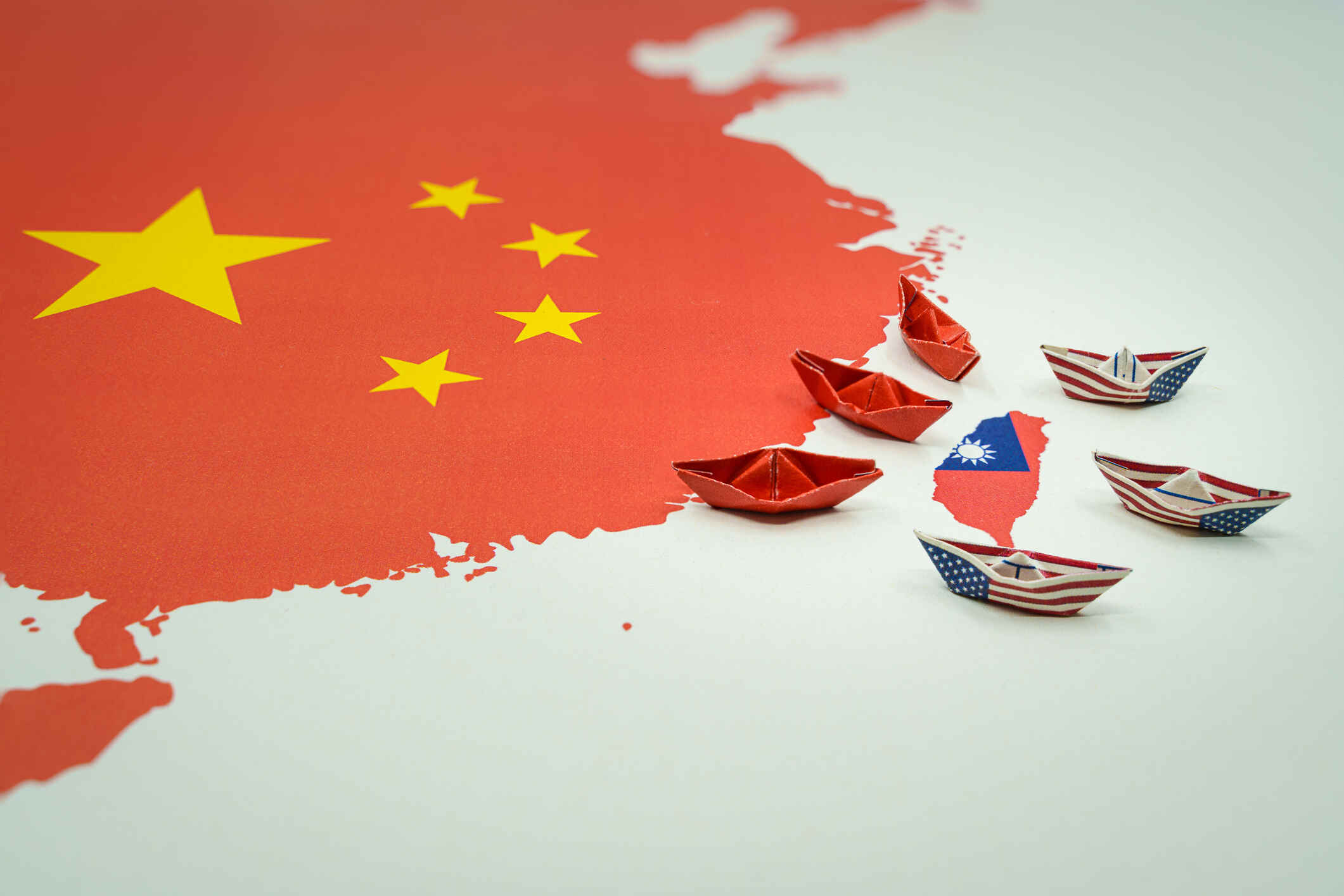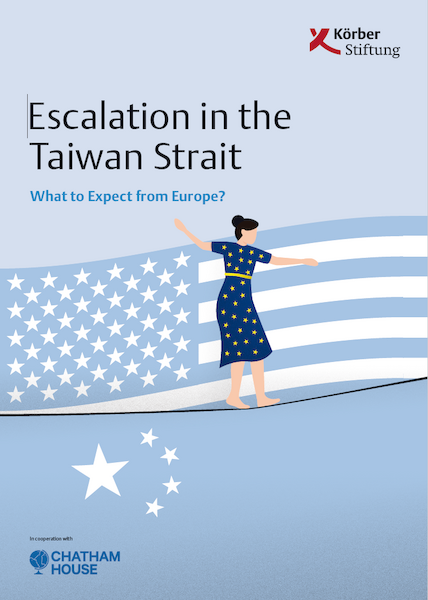
Escalation in the Taiwan Strait: What to Expect from Europe?
Photo: iStock/Tanaonte
Over the last few years, tensions in the Taiwan Strait have led to great concerns over Chinese territorial claims in the region. The potential for an escalation is high – with significant implications for Europe. At the same time, the Biden administration is pursuing a tough stance on China and expects Europe to join a transatlantic approach. Against this backdrop, the Körber Policy Game brought together a high-level group of senior experts, politicians, and officials from France, Germany, Italy and the UK to address a fictional scenario of a political-security crisis in the Taiwan Strait. How will Europe position itself in an escalation between China and the US against the backdrop of trade tensions and a threat of Chinese intervention in Taiwan? Which interests are at stake for Europeans, and which policy options do they have at their disposal? Can Europe find a coherent strategy in a crisis, considering China’s relevance for economic and trade relations? The Körber Policy Game projects current foreign and security policy trends into a future scenario. The aim is to develop a deeper understanding of the interests and priorities of different actors as well as possible policy options.
Previous Körber Policy Games have discussed Europe’s post-COVID-19 future, a US withdrawal from NATO and Turkey’s role in Syria.
The discussions took place online in May 2021 under Chatham House Rule in cooperation with the Chatham House Asia-Pacific Programme. This report summarises the results and presents policy recommendations. It reflects the analysis of the Körber Policy Game by Körber-Stiftung and Chatham House’s Asia-Pacific Programme and not necessarily the view of the participants.
Executive Summary
Economic Interests: The Körber Policy Game demonstrated that during a crisis in the Taiwan Strait, Europeans would be very concerned about the fallout for the global economy and their national economies, especially in vulnerable sectors such as the semiconductor industry. The teams recommended strengthening European resilience, diversifying supply chains and conducting surveys on access to critical goods and technologies, such as rare earths. These issues would also represent an area for UK-EU cooperation. The teams also discussed whether US-Chinese competition over technological supremacy would be in Europe’s interest.
“London would be confronted with competing interests: upholding stability across the Taiwan Strait versus securing the economic interests of the UK.”
Taiwan’s Democracy: Europeans were undecided whether protecting Taiwan’s democracy would justify military action. However, they acknowledged that a unilateral change in the status quo would represent a watershed moment and a fundamental challenge to the rules-based order and the US-led alliance system. It would also bolster China’s regional and global political and military power.
Military Intervention: Faced with a military escalation, Europeans favoured internationally coordinated economic sanctions against China as their instrument of choice rather than military action. They were especially cautious about a role for NATO, as they argued that article 5 would not apply in this case. Germany and Italy would be most reluctant, followed by France and the UK. All teams would hope to avoid military action for as long as possible. A blockade of Taiwan lasting more than a few days was expected to result in military escalation.
Alignment with the US: Europeans diverged on the extent to which they would align their policies and positions with those of the US. The UK highlighted its special relationship, but was concerned about being caught up in an escalation dynamic. France and Italy opted against unconditional alignment and favoured developing an EU position with the hope of exerting influence on the US. The German team advocated for as much damage control as possible, and as much transatlantic solidarity as necessary.
“From Rome’s perspective, the EU should not just follow US policy, but develop its own position towards a crisis over Taiwan.”
European Unity: EU member states underlined the importance of a common European stance. The German team suggested establishing a European Solidarity Fund to cushion the potential impact of Chinese sanctions against EU economies. France would aim to present the EU as a credible global player and was concerned about Chinese efforts to exploit divisions among member states. Italy’s participation in the Belt and Road Initiative played no major role in EU considerations.
“A Chinese intervention in Taiwan would represent a grave violation of the status quo and a watershed moment for France if economic interests were to be prioritized over principles.”
Russia’s Role: Europeans were undecided which role Russia would play in a military escalation in the Taiwan Strait and whether it could be convinced to act as a mediator or would immediately side with China. A Russian-Chinese alliance would be a worst-case scenario and hinder de-escalation efforts, such as at the UN Security Council.
Regional Partners: All European teams emphasised the importance of partners in the Indo-Pacific and would engage in efforts to build alliances. This was particularly the case for example with France as a military supplier to the region. The UK suggested “to make the Indo-Pacific real” and would coordinate a passage through the South China Sea with Japan and the US.
Public Opinion: For Europeans, public opinion played an important role in their considerations to engage in military action. The distance to Taiwan and the ambiguity over Taiwan’s status would make direct involvement particularly difficult for some European countries such as Germany.
“The ‘tyranny of distance’ would make it very difficult for Berlin to publicly make a case for direct involvement. Instead, Germany should focus on economic instruments and burden sharing.”
Global Effects: The Italian team was concerned about the effects of a crisis over Taiwan on the Middle East, and whether countries in the region would align with Chinese positions. Furthermore, the German team was apprehensive about the emergence of a world order with a Chinese and a US-led bloc and the detrimental effects that this would have on the management of global and regional challenges.
Policy Recommendations
1. Prepare for the consequences.
Europeans should prepare for the political and economic implications of a crisis over Taiwan and a significant deterioration of relations with China. This includes conducting surveys on economic dependencies, potential leverage and pressure points, as well as the economic fallout of sanctions and countersanctions on Europe. Special attention should be paid to critical goods and technologies, such as rare earths. (Economic) solidarity remains crucial to prevent attempts to divide Europeans, and to strengthen Europe’s resilience.
2. Clarify and prioritise strategic interests.
European countries should clarify their economic, democratic and geopolitical interests when it comes to Taiwan. Furthermore, they should prioritise the political, economic and military instruments that they would focus on in a crisis over Taiwan and the circumstances under which they would implement them. Judging by the current situation, Europeans’ strategic interests are mostly in expanding economic ties, guaranteeing supplies for the semiconductor industry, and supporting democracy in Taiwan. This analysis should serve as the basis for longer-term policy formation.
3. Pursue expectations-management.
Europeans should pursue expectations-management towards the United States on the extent to which they would support their transatlantic partner in a crisis over Taiwan, especially concerning military engagement, whether bilateral or through NATO. This is particularly important given that Europeans remain very interested in engaging with Beijing on the economic and global governance aspects of international affairs. A successful response should be based on transatlantic unity, which could be built up in advance through joint scenario and contingency planning.
4. Strengthen relations with Indo-Pacific partners.
Close coordination with Indo-Pacific partners would be crucial during escalation in the Taiwan Strait. Across the region, countries would have to strike a cautious balance between maintaining beneficial security ties with the US and close trading partnerships with China. Europeans should further engage with Indo-Pacific partners both economically and politically and invest more in existing security partnerships to enable continuous monitoring of the Strait situation and joint responses to crises.
5. Engage the public.
A sustained debate is needed to increase awareness among the public in European countries as to why a crisis over Taiwan would matter, despite the ambiguity over Taiwan’s status, its distance, and uncertainty about the consequences for Europe if conflict were to escalate between the US and China. Public engagement would not necessarily mean that it would be easier for policy-makers to make a case for military engagement, especially given recent experiences in Afghanistan. However, it would help to counter disinformation campaigns during a crisis and to explain or justify the economic fallout of sanctions, if necessary.
6. Consider Russia’s response.
Russia’s position in a crisis over Taiwan represents an important marker of the strength (or weakness) of the Russian-Chinese relationship both in rhetoric and in substance. Europeans should develop a joint understanding of Russia’s interests in a potential conflict and its policy options. In particular, Europeans should draw up a realistic assessment of whether Russia would be more likely to side with China, remain ambivalent, or act as a mediator, and which incentives could influence Russia’s calculus.
Media and Downloads



